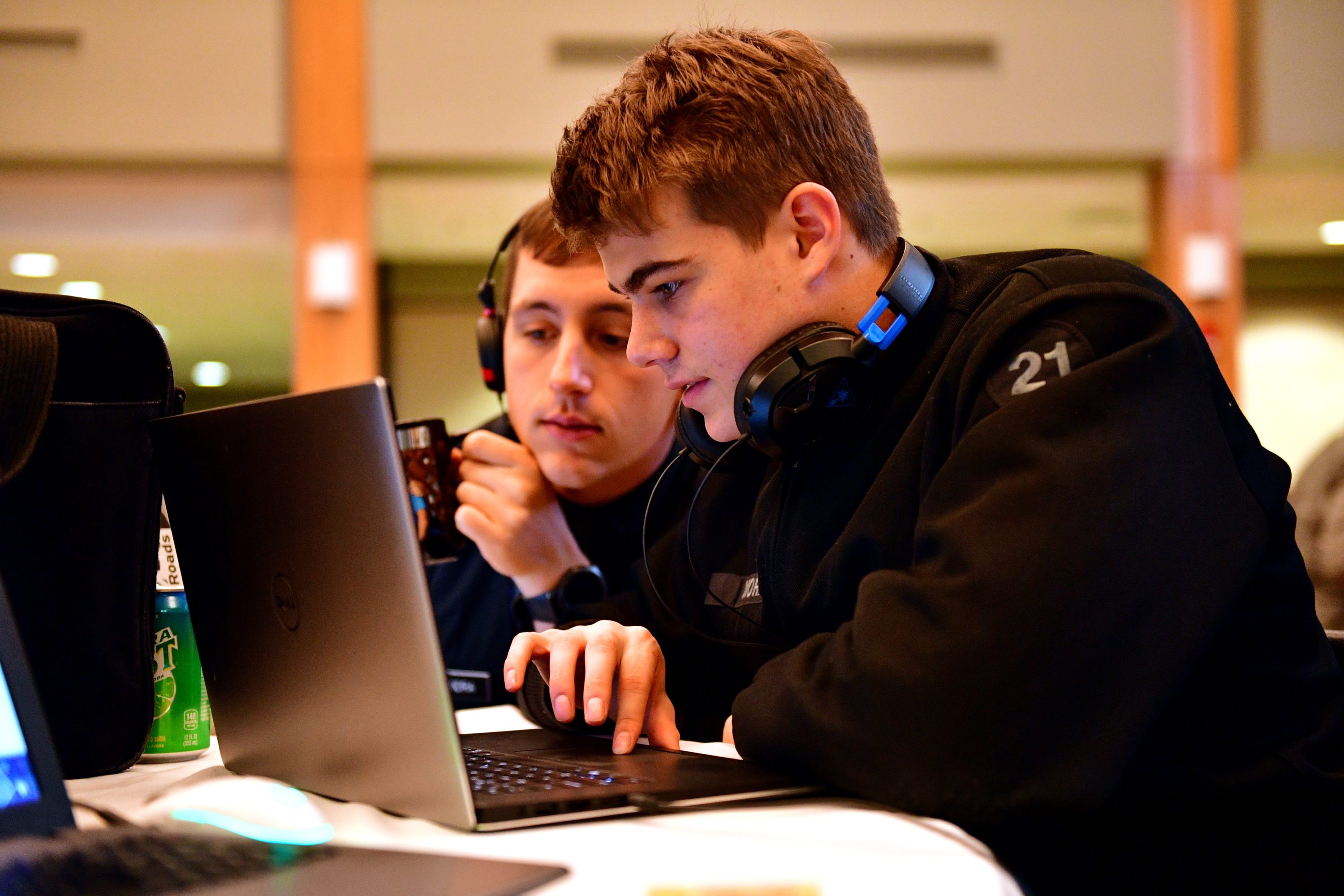Cyber Fusion Offers Challenges, Opportunities

Cadets Andrew Morin ’21 and Willem Sciandra ’21 compete with the VMI team during the Cyber Fusion Cup Competition Feb. 23 in Marshall Hall. VMI photo by H. Lockwood McLaughlin.

Cadets Andrew Morin ’21 and Willem Sciandra ’21 compete with the VMI team during the Cyber Fusion Cup Competition Feb. 23 in Marshall Hall. VMI photo by H. Lockwood McLaughlin.
On Feb. 22-23, 2019, VMI hosted the third annual Commonwealth Cyber Fusion and Virginia Cyber Cup Competition in the Center for Leadership and Ethics. During the two-day event, students and faculty members from 17 schools learned, collaborated and competed in myriad cybersecurity related activities while having the opportunity to interact with and learn from companies and employers related to the field.
“What this is really trying to get us to do is look further into cybersecurity and how it’s going to affect the world,” summarized Cadet Zach Harris ’20.
Most of the job-oriented activities took place Feb. 22. Activities throughout the day included job fairs, an employer panel discussion, and a student, faculty and co-host dinner.
“It’s good to be back,” said Darius Parker ’99, who was there representing Northrup Grumman, where he has worked for 20 years. He talked with interested students and potential future employees of the company at the event. “It’s always good to be back and to help out. A lot of people helped me, so to be able to turn around and help somebody else I think is tremendous,” he said.
“They’re qualified candidates right away, so it’s advanced interviewing when they go on in there, and that has improved each year,” said Maj. Doug Wainwright, coach of the VMI cyber club. “I expect the improvement to keep coming.”
Friday evening, keynote speaker Chris Wysopal, co-founder and chief technology officer of Veracode, spoke to the attendees in the Gillis Theater. Wysopal was part of a high-profile hacker team in the ’90s called Lopht that helped shed light on cybersecurity vulnerabilities.
“I wanted to talk about some of my roots from the hacker community,” said Wysopal, adding that they “used the hacker mindset and took it from something that you might think of as the bad guy and used our thinking to improve cybersecurity.”
“One my favorite parts was the keynote speaker,” said Harris, who competed at the conference. “He was talking about how he testified before Congress, and that’s a really famous moment in the community. And it’s just kind of surprising that you can get people like that.”
In association with the Virginia Cyber Range, a state-funded research and educational institute, U.S. Sen. Mark Warner played a role in making this year’s conference a reality. Although he could not attend due to the Senate being in session, his video address helped kick off the conference.
“We need talented cybersecurity professionals now more than ever,” Warner said. “That’s why I’m encouraged to hear about the high quality of students attending this year’s Cyber Fusion. I hope this event will allow you to strengthen your skills and connect with experts in your fields and potentially folks that might be interested in hiring you.”
The main event Saturday was the cyber competition itself. Teams from schools all over Virginia gathered in the Hall of Valor, where, over the course of several hours, they were presented with a set of cybersecurity challenges that would test their knowledge and problem-solving abilities. There were plenty of difficult problems set forth, and, while no team solved all of them in the allotted time, some got close. A live feed that charted each team’s progress and standings was projected onto a large screen as the competition progressed.
“Got up to fourth place,” said Cadet Peter Boyle ’19. “We were there for about a half-hour.” By the end of the allotted time, VMI’s team placed eighth amid the competitive pool of 17 teams, and the University of Virginia walked away with the top spot.
“This year went a lot better,” said Boyle, noting that the team was able to build on the knowledge gained in last year’s cyber challenge. “The competition was one of my favorites due to its practical application of your skills and it’s all helping you learn.”
“We are trying to solve problems that are in computer systems … maybe a decade older than what we have right now but it’s still problems that are going to continue to grow and we need to learn to solve things like this, and look for them,” said Harris, who, with his VMI team, came close to breaking the WEP authentication challenge before they were cut short by the clock. WEP authentication is used in internet connected devices, including many modern internet routers.
Outside of the competition itself, there was constant collaboration and interaction among students from each school. “It’s nice to see people coming in from all part of the state coming together, sharing ideas, and just getting to know each other,” said Boyle. “We’re going to be working together in some capacity and getting that foundation started now. It’s just going to help build and make improvements that much better.”
With another successful conference wrapped up, Wainwright reflected on his team’s experience: “We’re getting better every year and I look forward to maybe getting to top three next year.”